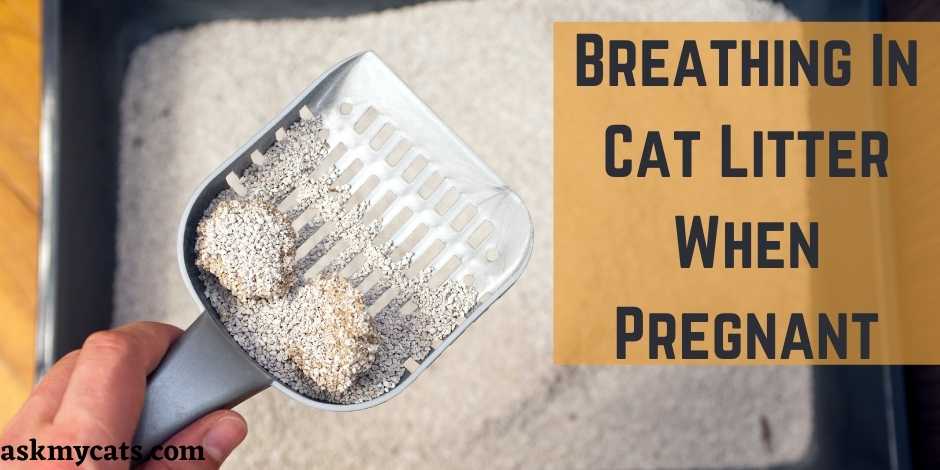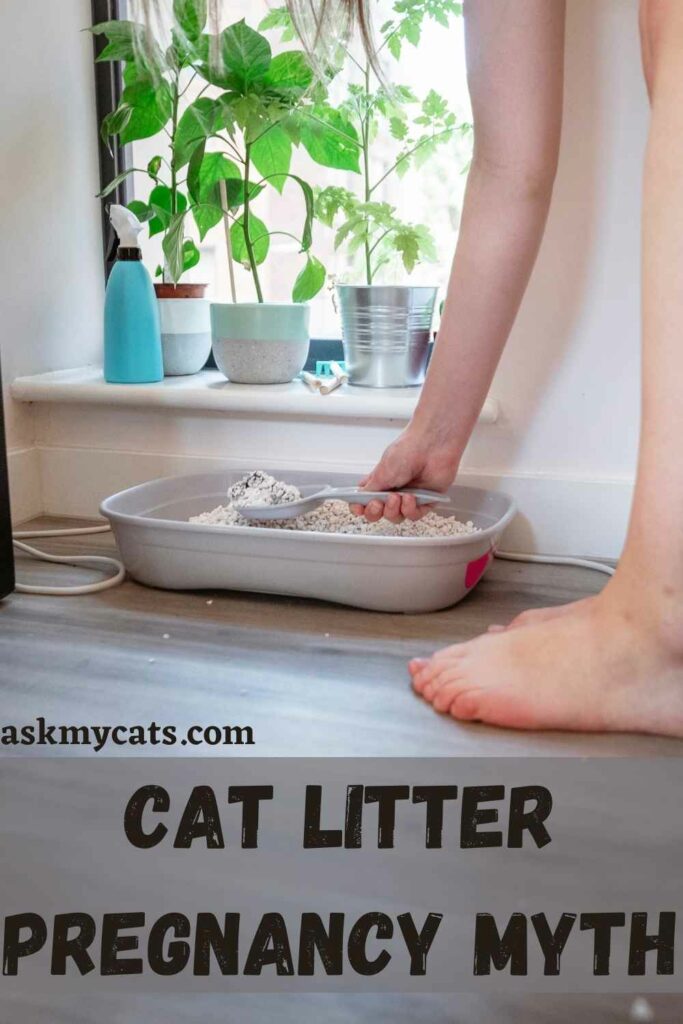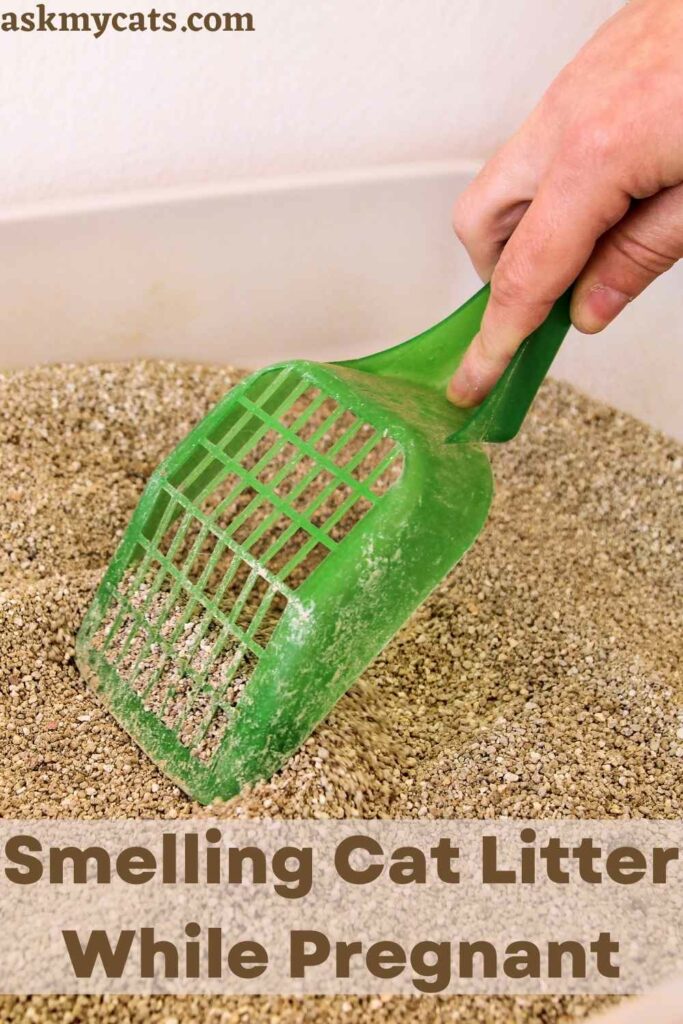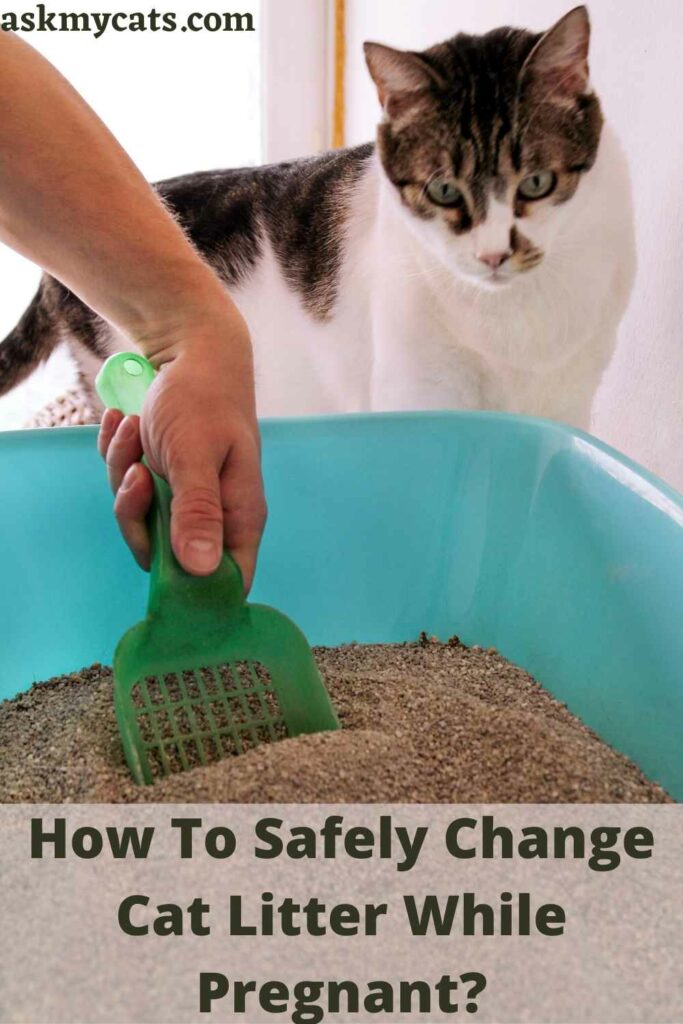You’ve probably heard of the risk of toxoplasmosis, a parasite disease that can be particularly dangerous if you’re pregnant. Toxoplasmosis can be contracted by inhaling dust from infected litter, but it can also be contracted by direct contact. Although some persons are at a larger risk than others, complications are uncommon.
However, is breathing in cat litter when pregnant safe?
It is recommended not to breathe in cat litter when pregnant as it can contain toxoplasmosis. However, you can pick up your cat’s litter with some precautions.
This article will talk about can you breathe in kitten litter when pregnant and the precautions you must take.


Give Your Cat the Perfect Day
Get the Free Ebook!
Cat Litter Pregnancy Myth
The cat litter pregnancy myth of cats giving toxoplasmosis to pregnant women has been causing misery for a long time.

Pregnant women can transfer toxoplasmosis, a rare parasite disease, to their unborn offspring, and infection with toxoplasmosis can cause miscarriage or deformed babies.
Because toxoplasmosis can be transmitted by contact with cat excrement, many pregnant women are advised to give their cats away or keep them outside. Neither is required.
Your cat is unlikely to infect you with toxoplasmosis. “People are more likely to develop [toxoplasmosis] through eating raw meat or from gardening,” according to the Centers for Disease Control and Prevention.
The HSUS has put up a list of toxoplasmosis prevention tips to assist you and your infant stay safe.
Toxoplasmosis is spread by cats eating contaminated raw meat, birds, mice, or soil.
Cats, on the other hand, aren’t the only animals that can spread it; they’re the only ones who shed the infectious stage in their feces. Toxoplasmosis can also be contracted by infected, undercooked meat from other animals.
Also, check out can i sleep with my cat while pregnant
Fears about cats’ participation in disease transmission can be alleviated by understanding the life cycle of Toxoplasma gondii (T. gondii) and the role that cats play in disease transmission.
T. gondii is a protozoan that may infect any animal, including intermediate hosts. Once a cat has been infected with toxoplasmosis, he usually develops immunity and can only be reinfected on rare occasions.
As a result, a cat’s first encounter with T. gondii usually results in him excreting potentially infectious oocysts (reproducing microorganisms). Furthermore, oocysts are not immediately infectious, requiring a one to five-day incubation period.
Undercooked meat, which includes T. gondii within tissue cysts, is the most prevalent way for humans to develop the disease.
Direct eating of infective oocysts is a less prevalent form of acquisition. Finally, when a mother contracts the disease while pregnant, she may transmit it to her unborn child via transplacental transmission.
Toxoplasmosis can be avoided during pregnancy by taking sensible precautions, and euthanizing your cat would be terrible for both of you.
If you’re worried about your health, it’s far better to enjoy your cat’s affection and company during your pregnancy and after the delivery of your child.
Also, check out about i'm pregnant and my cat follows me everywhere
Smelling Cat Litter While Pregnant
You should avoid smelling cat litter when pregnant as it can give you toxoplasmosis, which can cause several complications.

You’re generally considered immune to toxoplasmosis if you’ve had it before, which can protect your unborn kid from contracting the condition.
According to the Centers for Disease Control and Prevention, roughly 15% of persons aged 12 and above in the United States have toxoplasmosis – often without even realizing it.
In adults, toxoplasmosis can induce flu-like symptoms, but the condition can also go undetected.
However, if you contract toxoplasmosis while pregnant, you may become ill and pass the infection on to your kid.
Toxoplasmosis can also cause catastrophic birth problems, such as eye and brain damage if a baby contracts it during pregnancy.
If you are infected while pregnant, you can be treated with medicine, but you and your baby will need to be constantly monitored throughout your pregnancy and after delivery.
Preventing toxoplasmosis during pregnancy is as simple as following these guidelines:
- Have someone else change the kitty litter.
- If you have to change the litter manually, do so once a day at the very least. The litter becomes contagious after one to five days.
- When changing kitten litter or gardening, use gloves.
- After that, properly wash your hands.
- Experts believe that nearly half of toxoplasmosis infections are caused by eating raw or undercooked pork.
- Before consuming your vegetables, make sure it’s clean.
The symptoms of toxoplasmosis may seem frightening, but before you give up your beloved cat, be assured that indoor cats are extremely rare to possess the disease. You may also be immune if you’ve been around cats for a long time.
However, you’ll want to take some extra care. Here’s how cats can contract toxoplasmosis and pass it on to other cats.
Felines are the parasite’s natural hosts, and it reproduces in their intestines. Toxoplasmosis can be transmitted to a cat by eating infected prey or raw meat, or by drinking unpasteurized milk or contaminated water.
You might also like to know about Do Cats Know When Baby Is Coming
Can I Be In The Same Room As Cat Litter While Pregnant?
No, you should not be in the same room as a cat litter while pregnant as cat litter can be a host of various parasites including toxoplasmosis.
Toxoplasmosis is a parasitic ailment that affects many people. Toxoplasma gondii is the name of the parasite. It grows inside cats and then spreads to other animals and humans.
Mild or no symptoms are common in people with good immune systems. Many adults are unaware that they have toxoplasmosis.
People with weakened immune systems, on the other hand, are at a significantly higher risk of catastrophic consequences.
Damage to the following organs may occur as a result of these complications:
- eyes
- brain
- lungs
- heart
A pregnant woman who develops the infection can pass the infection to their baby. This can cause the baby to develop serious birth defects.
Toxoplasma infection usually starts when a cat eats meat (mostly rodents) that contains infectious toxoplasma cysts. The parasite subsequently replicates within the intestines of the cat.
During the sporulation process, millions of infectious cysts are shed in the cat’s feces during the next few weeks. The cyst walls stiffen during sporulation, and the cysts go into a dormant yet infectious stage for up to a year.
You should not be in the same room as your cat litter, as it can give you toxoplasmosis and you can transfer it to your unborn child, which can have serious health implications.
On an ultrasound, some newborns exhibit indications of illness. Abnormalities in the brain and, less commonly, the liver may be noticed by your doctor.
After the illness has progressed, toxoplasmosis cysts can be detected in the baby’s organs. Infection of the neurological system causes the most serious damage.
Damage to the baby’s brain and eyes can occur both in the womb and after birth. It can lead to vision loss or blindness, as well as intellectual disabilities and developmental delays.
You might be like to read about my cat keeps laying on my stomach am i pregnant
Is Smelling Cat Litter Bad For Pregnancy?
Yes, smelling cat litter is bad for pregnancy as it is not only harmful to you but also to your unborn child.
Toxoplasmosis is a parasitic infection caused by a specific parasite that causes only minor symptoms or remains unnoticed in the majority of humans and animals.
After consuming affected small animals such as birds or rodents, cats spread the parasite through their excrement. While the virus does not affect the cats, the parasites they release can be harmful to pregnant women.
When a pregnant woman cleans the litter box of an infected cat, she is exposed to the parasite. If the mother touches her mouth after coming into contact with the parasite, she risks becoming infected, putting her fetus at risk of major difficulties at birth or later in life.
The parasite can cause major eye infections or other eye issues before or during birth, as well as brain damage, stillbirth, or an aborted fetus.
While many babies with toxoplasmosis may not show any symptoms at first, they may develop blindness or intellectual handicap as a result of the infection.
Any cat that is allowed outside or is fed raw or undercooked meat may be infected with the parasite. Any contaminated excrement from infected cats can endanger a woman’s pregnancy.
While some cat excrement might cause serious or even fatal difficulties in a growing fetus, pregnant women do not need to avoid cats entirely. Toxoplasmosis is greatly reduced if you stay away from the litter box.
Furthermore, expectant moms should use caution not only while touching cat excrement, but also when handling raw meat.
If pregnant women eat raw or undercooked meat or handle raw meat without washing their hands quickly, they are more likely to contract toxoplasmosis.
So there’s no need for the cat to pack her belongings when the happy news of impending birth is announced. Keep her inside, feed her only prepackaged cat food, and try to stay away from her litter box.
How To Safely Change Cat Litter While Pregnant?
You can safely change cat litter while pregnant by following these steps: –

Use litter boxes that clean themselves. Once you’ve gotten used to a self-cleaning litter box, you and your cat may never want to go back. Early versions were clumsy, but newer versions are far more user-friendly. The ScoopFree Ultra self-cleaning litter box, for example, includes safety sensors that delay the start of the cleaning cycle for 20 minutes after your cat has exited the box.
Keep in mind that you’ll still need to clean the inside of most self-cleaning litter boxes and dispose of the litter trays and trash that collects in the covered compartment.
If your cat refuses to use self-cleaning boxes, be cautious while selecting cat litter. Choose a cat litter that won’t adhere to your cat’s paws and hence spread throughout your house. Always use disposable gloves when scooping and wash your hands afterward.
A dust-repellent odor-control cat litter is also recommended. Both BoxiePro Deep Clean scent-free probiotic clumping cat litter and Boxiecat extra strength scent-free premium clumping clay cat litter are good choices.
Toxoplasma parasites do not become contagious until they have spent at least 24 hours in the cat’s excrement. By scooping the litter box after each use, or at least once a day, you can limit the risk of the Toxoplasma gondii parasite being transmitted.
Anything that keeps the waste from your litter box contained effectively and quickly is a good idea. Litter disposal systems are an excellent technique to contain the odor and diseases found in cat waste. The Litter Genie Plus cat litter disposal device, for example, uses an eight-layer bag to keep the pail’s contents safe.
A cat litter box enclosure system with childproof locks on the lid is a fantastic option if you have additional pets or small children. The LitterChamp premium odor-free cat litter waste disposal system is one such option.
If women use cat supplies like these, they can safely be pregnant with cats in the same house. Despite the fact that pregnant women and cat litter do not mix, there is no need to rehome your feline companion if you take proper care of him.
Frequently Asked questions
How is toxoplasmosis treated during pregnancy?
If you get toxoplasmosis while pregnant, you have a few alternatives for therapy. Your amniotic fluid can be examined to confirm if you have a fresh and first toxoplasmosis infection. Medication may help to avoid fetal mortality or major neurologic abnormalities, but it’s unknown whether it can help to prevent eye impairment. These drugs have their own set of side effects. Your doctor may give an antibiotic called spiramycin for the duration of your pregnancy if there is no indication of infection in your baby. This can assist to lower your baby’s infection risk.
When should I be concerned about toxoplasmosis?
Your unborn kid is generally safe if you were infected with Toxoplasma before becoming pregnant. Some physicians advise waiting six months after a recent infection before trying to conceive.
How common is toxoplasmosis?
Toxoplasmosis is a disease that affects people all over the world. Central America and Central Africa are the most common places to find them. This is most likely due to the weather conditions in these places. The length of time toxoplasma cysts remain infectious is affected by humidity. Culinary traditions of the area also play a part. Infection rates are higher in areas where meat is served raw or undercooked. Fresh meat that has not been frozen earlier is also linked to an increased risk of infection. Toxoplasmosis has infected an estimated 11 percent of people in the United States between the ages of 6 and 49.
Final Words
If you’re expecting a child, you should take the precautions listed above. Also, at least three months before becoming pregnant, you should consult your doctor to review your risk factors.
A blood test can be done by your doctor to see if you’ve ever had toxoplasmosis. If this is the case, your body generates antibodies that protect you from contracting the virus again. If your blood test indicates that you have never been infected, you should continue to take precautions and get another test as your pregnancy progresses.
If you have any unanswered questions, ask us in the comments sections.
